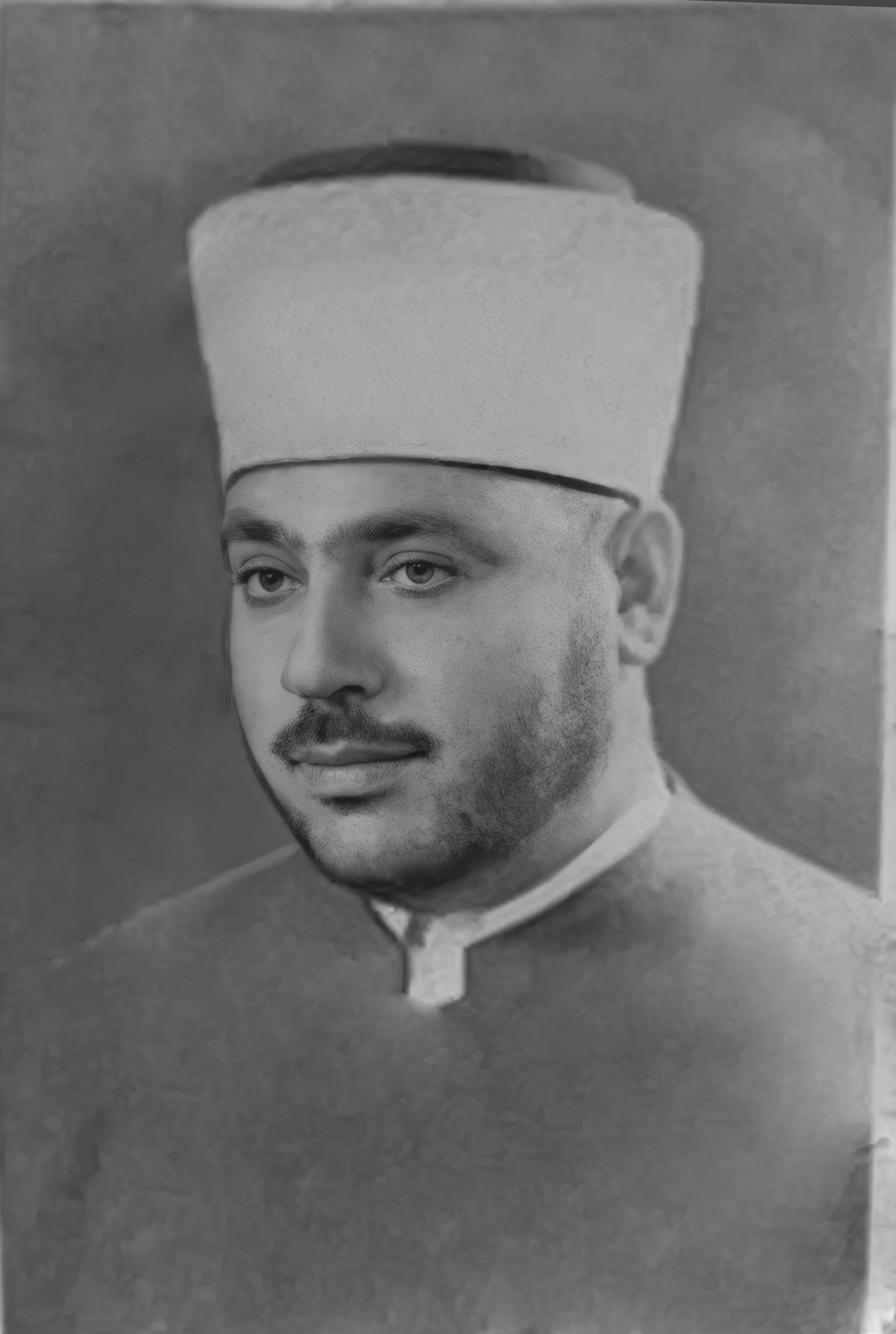Al-Silwadi (Sheikh), Juma'a (1919-1971)
Sheikh Juma'a Musa Abdul Al Qader Al- Silwadi (1919-1971): Born in the town of Silwad, near the city of Ramallah in 1919, he studied at the Amiriya School in Silwad and then completed his education in Haifa until he qualified for admission to Al- Azhar University in Cairo, Egypt in 1937. He continued his education at Al- Azhar University for eight years and obtained three degrees there: Al- Alemiyya Degree with High Honours in 1939, the High Degree in Sharia Law from the College of Islamic Sharia Law at Al Azhar University in 1944, and Al- Alemiyya Degree with a license to practice Sharia judiciary from the College of Sharia Judiciary at Al Azhar University in 1945, the highest degree granted by Al Azhar University at the time, which is equivalent to a Professor Doctorate. After graduating from Al Azhar, he returned to Palestine and was appointed as a legal scribe for the Sharia courts of the cities of Jaffa, Al-Bireh, Amman, and Al-Salt. Starting from 1953, Sheikh Juma’a was appointed as a Sharia Judge in each of the cities of Deir Abu Sa`id, Ma’an, Tafila, and Bethlehem, and then in the city of Nablus in 1963, in addition to his membership in the Sharia Appeals Court in Al-Quds City, holding these two positions until he died in 1971. Sheikh Juma’a was an activist for Palestinian rights, participating in revolutionary resistance to defend Palestinian villages and cities against the attacks of Zionist militias leading up to and during Al-Nakba of 1948. He had notable contributions to various battels that took place, the most notable of which is the Battle of Bab El-Wad. Sheikh Juma’a became a member of the Joint National Committee of the District of Ramallah since its establishment and, on behalf of the committee, he presented a eulogy lamenting the loss of Palestine’s son and martyr, Abd Al Qader Al Husseini, at his funeral in the city of Al Quds on April 9th, 1948. After Al-Nakba he continued to serve as an active member with the Joint National Committees which managed the affairs of Palestinian society locally from May 1948 till April 1950 (the annexation of the West Bank to Jordan). Sheikh Juma’a was a key contributor to the organizing and support of relief programs for Palestinian refugees, displaced from their villages and cities in 1948 and 1967. After the 1967 Israeli Occupation, he worked tirelessly as a member of the Supreme Islamic Council, joining forces with distinguished sharia judges in the West Bank and Al Quds, along with prominent Palestinian figures, to stop the Occupation’s attempt to extend its sovereignty over Islamic courts, Islamic endowments, and Al- Aqsa Mosque. Despite being repeatedly threatened with deportation by the Israeli military governor while he was in Nablus, Sheikh Juma’a remained steadfast in his stance, refusing to bend to the Occupation until his death. Sheikh Juma’a had an essential and critical role in committees that worked to renovate and build mosques, programs, and institutions that would benefit orphans, widows, and the underprivileged throughout Palestine. He provided his scholarly opinion and advice on issues of the Islamic Sharia. He was a highly revered and respected member of the community Palestinians sought him out at his home to seek his guidance relating to familial and social issues. Sheikh Juma’a passed away in Al Quds on December 7th, 1971, and final resting place is the place of his birth, in the village of Silwad.

الشَّيْخ جُمْعَة مُوسَى عَبْد القَاِدر السِّلْوادي (1919-1971); وُلِد في بَلْدة سلواد قَضَاء مَدِينَة رَامَ الله عَام 1919, دَرَسَ فِي المَدْرسَة الأَمِيريّة في سلواد, ثُمَّ أَكمَلَ تَعلِيمَهُ في حَيْفا حتَّى تَأهَّلَ للالْتِحاق بِجَامِعَة الأَزْهر الشَّرِيفْ في القَاهِرَة عَام 1937; تَابَعَ تَعلِيمَهُ في الأَزهَر لِمُدّة ثَمَانِ سَنَوات; حَصَلَ فِيهَا عَلَى ثَلاثَة شَهادات; حَصَلَ عَلَى الشَّهادة العَالمِيّة مع التَّفَوُّق والاقْتِدَار عَام 1939; وعَلَى الشَّهادة العَالية مِنْ كُليّة الشَّريعة الإِسلاميّة عَام 1944; وعَلّى الشَّهادَة العَالِمِيَّة مَع الإجَازة بالقَضَاء الشَّرْعي مِنْ مَعْهَدْ القَضَاء الشَّرْعي بِجَامِعَة الأَزهر الشَّرِيف عَام 1945، وهِيَ أَعْلى شَهَادَة يَمْنَحُها الأَزهَر في ذَلِكَ الوَقْتْ وتُعَادِل دَرَجة الدُكْتُورَاة الأُسْتَاذِيّة الّتي تَمْنَحهَا الجَامِعَات حَاليّاً; وبَعْدَ تَخَرُّجِه مِنْ الأَزهر عاَدَ إلى فِلَسطِين وعُيِّن كاتِباً للمَحاكِم الشَّرْعيّة في مُدُنْ يَافا، والبِيرة، وعَمّان، والسَلْط; وإبتداءً مِنْ العَام 1953 عُيِّن، قاضِياً شَرْعيّاً في كُل مِنْ مُدُن دِير أَبو سَعِيد، ومعان، والطفيلة، وبَيْت لَحْم، ثُمَّ في مَدِينَة نَابلس مُنْذ العَام 1963، بالإِضَافَة إِلى عُضوِيّتِه في مَحكَمِة الاسْتِئنَاف الشَّرْعيّة في مَدِينَة القُدْس، وبَقِيَ بِهَذيْن المَنْصِبَين حَتَّى وَفاتِه في العَام 1971; انضَمَّ للعَمل الثَوْري مِنْ أَجْل الدّفَاع عَنْ القُرَى والمُدُن ْالفِلَسْطِينيّة ضِدَّ هَجَمَات العِصَابَات الصُهيُونيّة إِبَّانَ وأَثْنَاءَ نَكْبَة عَام 1948; حَيثُ كانَ لَهُ مُساهَمَة خَاصَّة وفاعِلَة في المَعارِك، ومِنْها مَعْركِة بَابَ الوَادْ; أصبَحَ عُضواً في اللَّجْنَة القَوْميَّة المُشترَكَة في لِواء رام الله مُنْذُ إنْشائِهَا، ونِيابَةً عَنْها أَلْقَى كَلِمة رِثَاء لِفَقِيد الشَّعبْ الفِلسْطيني، الشَّهِيد عَبد القادِر الحُسِينِي، أَثْنَاءَ تَشْييع جُثمَانِه الطَّاهِر في مَدِينَة القُدْس في التَّاسِعْ مِنْ نِيسَان عَام 1948; وَبَعْدَ النّكْبَة، وَحِرْصاً مِنْهُ عَلَى كُلِّ مَا هُوَ فِلَسْطيني, اسْتَمرَّ فَاعِلاً مَعْ اللّجَان القَوْميَّة المُشتَرَكَة في إِدارَة شُؤُونْ المُجْتَمَع الفِلَسْطِيني مِنْ أيّار عَام 1948 وحَتّى نِيسَان مِنَ العَام 1950 (إِعْلَانْ الوَحْدَة مَعَ الأُرْدُن); سَاهَمَ في تَنْظِيمْ ومُسَانَدة بَرامِجْ إِغَاثَة اللاجِئِين الفِلَسطينيين الذين هُجِّروا مِنْ قُرَاهُم ومُدُنِهم عَام 1948 وعام 1967; أصبَحَ عُضواً في الهَيْئة الإِسْلاميّة العُليا، فَبَعْدَ احْتِلَال عَام 1967 مُبَاشَرة، عَمِل بِفَاعليّة مَعْ نُخْبَة القُضَاة الشَرعيين في الضِّفّة والقُدْس، والشَّخْصِيّات الوَطَنيّة الفِلسْطينيّة، والّذين تَصَدُّوا لِسُلُطات الاحْتِلَال في مُحَاوَلاتها لِبَسْطْ سِيَادَتِها عَلَى المَحاكِم الشَّرْعيّة، والأَوْقَاف الإِسلَاميّة، والأَقْصَى الشَّريف; وقَدْ هَدَّدَهُ الحَاكِمْ العَسْكِري الإِسْرائِيلي لِمَدينَة نَابلس بالإِبعاد أَكْثَرَ مِنْ مَرّة في تِلْكَ الفَتْرة ، إلَّا أنَّهُ بَقِيَ صَامِداً عَلَى مَوْقِفِه الرّافِضْ لِأيّ سُلْطَة للاحْتِلَال حَتَّى وَفَاتِه; كان لَهُ دَوْر رَئِيسي وفَعَّال في لِجَان العَمَل عَلَى تَرْمِيم وإِنْشاء العَدِيدْ مِنْ المَساجِدْ والبَرَامِجْ والمُؤَسّسات المُهْتَمّة بِالأَيْتام والأَرَامِل والمُحْتَاجِينْ في كَافَة أَنْحَاء الوَطَنْ; دَاوَمَ عَلَى تَقْدِيم الرَّأي والمَشُورَة في قَضَايا الشَّرِيعَة الإِسلَامِيّة، وإِصْلَاحْ ذَاتْ البَيْن للّذِينَ كَانُوا يَقْصُدُونَ بَيْته بِشَكلٍ دَائِم مِنْ كَافّة أَنْحَاء فِلَسطين; تُوفِّيَ في مَدِينَة القُدْس بِتَاريخ 7\12\1971، ودُفِن في مَسْقَطْ رَأسِهِ بِقَرْية سلواد.
